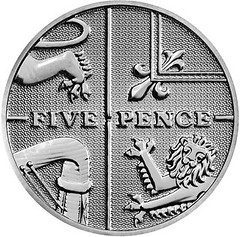
PREV ARTICLE
NEXT ARTICLE
FULL ISSUE
PREV FULL ISSUE
BRITAIN'S NEW STEEL 5P AND 10P COINS CALLED A 'DISASTER'
Jack Howes forwarded this story from The Telegraph about the purported new composition of the five and ten pence coins from the Royal Mint.
-Editor
The changes, which involves the coins being made from a different metal and becoming thicker, have never been officially announced by either the Royal Mint or the Treasury. Some experts have told The Daily Telegraph the change is a "disaster" and they are becoming increasingly alarmed the new coins will fail to work in hundreds of thousands of machines, and that the costs of implementing changes will run to as much as £100 million. The "silver" 5p and 10p coins have always been made from a metal known as cupronickel, an alloy made of 75 per cent copper, 25 per cent nickel. Indeed, all shillings, which preceded the 5p coin, were made from cupronickel following the end of World War II. However, from January 1 next year they will be made from steel, with a nickel coating. In most respects they will look identical and weigh the same, but sharp-eye observers will notice they will be 11 per cent thicker, moving from 1.7mm in depth to 1.9mm. They will also become magnetic for the first time. However, while most shoppers and schoolchildren receiving their pocket money might not notice the difference, nearly all vending machine and parking meters will. Office workers buying a cup of coffee or someone in a rush to park their car could suddenly find their money – perfectly legal tender – is not accepted. Jonathan Hilder, the chief executive of the Automatic Vending Machine Association, whose members service 500,000 vending machines in Britain, said: "We've told the Treasury and The Royal Mint that this is going to be a disaster, but they haven't taken notice. "It's meant to be a money saving exercise, but this will cost the vending industry £42 million and the coin machine industry as a whole possibly as much as £100 million." The problem comes about because tea and chocolate dispensers, as well as parking meters are sophisticated machines designed to detect fraudulent coinage. They test each coin by shape, weight as well as its electromagnetic composition. All machines will have to have their software updated, and in most instances, need to be recalibrated to recognise both the new coins and the old ones, which will continue to be in circulation for at least a decade. While the Royal Mint has given the industry a few samples of the new coins, they have not provided final production versions, making it impossible to start changing the machines. The industry said it does not have enough engineers to undertake the overhaul in less than four months.
To read the complete article, see:
New steel 5p and 10p coins a 'disaster'
(www.telegraph.co.uk/finance/personalfinance/consumertips/ The Numismatic Bibliomania Society is a non-profit organization promoting numismatic literature. See our web site at coinbooks.org. To submit items for publication in The E-Sylum, write to the Editor at this address: whomren@gmail.com To subscribe go to: https://my.binhost.com/lists/listinfo/esylum All Rights Reserved. NBS Home Page Contact the NBS webmaster 
|
 Britain's 5p and 10p coins are to be substantially changed next year, causing potential chaos for the millions of people using vending machines and parking meters.
Britain's 5p and 10p coins are to be substantially changed next year, causing potential chaos for the millions of people using vending machines and parking meters.